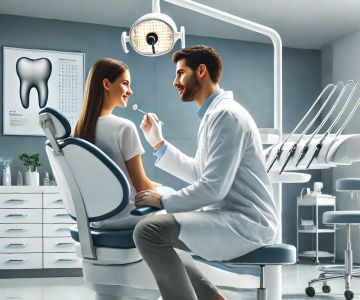How to Check for Oral Gonorrhea: A Complete Guide to Detection
Trending Blog Articles
Popular Dental Blog Posts
 Virtual Dental Consultations: A Convenient Solution for Your Oral Health Needs
Virtual Dental Consultations: A Convenient Solution for Your Oral Health NeedsExplore the benefits of virtual dental consultations and how online dental visits can improve your oral health. Learn how tele-dentistry offers a convenient, accessible solution for dental care.
 Why Skipping Dental Checkups Can Lead to Bigger Oral Health Problems
Why Skipping Dental Checkups Can Lead to Bigger Oral Health ProblemsDiscover why avoiding regular dental check-ups can result in significant oral health issues. Learn how consistent dental care prevents common problems and promotes long-term well-being. Visit Dentistry Toothtruth for expert insights.
 Unlocking the Secrets of Effective Oral Health Consultation
Unlocking the Secrets of Effective Oral Health ConsultationDiscover the importance of oral health consultation and explore expert tips for maintaining optimal oral hygiene. Learn how personalized dental advice can enhance your oral care routine and boost your overall wellbeing.
 Comprehensive Dental Care Services in the USA: Ensuring Oral Health with Dentistry Toothtruth
Comprehensive Dental Care Services in the USA: Ensuring Oral Health with Dentistry ToothtruthExplore the comprehensive dental care services offered by Dentistry Toothtruth in the USA. Learn about the importance of regular check-ups, professional care, and maintaining optimal oral health for a brighter smile.
Categories
Popular Dental Clinics
 Westgate Dental Arts
Westgate Dental Arts Coventry Family Dental
Coventry Family Dental Familia Dental
Familia Dental Dr. Daniel S. Fife, DDS
Dr. Daniel S. Fife, DDS Dentistry At Suburban Square: Michael I. Wollock, DMD
Dentistry At Suburban Square: Michael I. Wollock, DMD Comfort Care Dental
Comfort Care DentalTop Dental Blog Posts
Most Searched Dental Clinics
Hot Blog Topics
 The Importance of Oral Health Education During Pregnancy for a Healthy Pregnancy
The Importance of Oral Health Education During Pregnancy for a Healthy Pregnancy Why Skipping Dental Checkups Can Lead to Bigger Oral Health Problems
Why Skipping Dental Checkups Can Lead to Bigger Oral Health Problems Advantages of Porcelain Dental Restorations
Advantages of Porcelain Dental Restorations Best Tips for Brushing Your Teeth Properly for Healthy Gums: Essential Techniques for Oral Health
Best Tips for Brushing Your Teeth Properly for Healthy Gums: Essential Techniques for Oral Health How Can Diabetes Cause Tooth and Gum Problems? Preventing and Managing Oral Health Issues
How Can Diabetes Cause Tooth and Gum Problems? Preventing and Managing Oral Health Issues Healthy Habits for Promoting Good Oral Health and Hygiene: Tips for a Healthy Smile
Healthy Habits for Promoting Good Oral Health and Hygiene: Tips for a Healthy Smile 